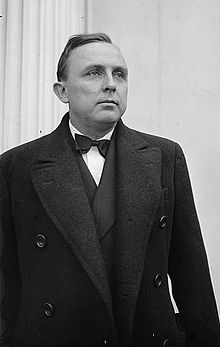Eurith D. Rivers
| Eurith D. Rivers | |
|---|---|

Rivers visiting the White House as the Georgian governor-elect on December 22, 1936.
|
|
| 68th Governor of Georgia | |
|
In office January 12, 1937 – January 14, 1941 |
|
| Preceded by | Eugene Talmadge |
| Succeeded by | Eugene Talmadge |
| Speaker of the Georgia House of Representatives | |
|
In office 1933–1937 |
|
| Member of the Georgia House of Representatives | |
|
In office 1924 |
|
| Member of the Georgia Senate | |
|
In office 1926 |
|
| Personal details | |
| Born |
Eurith Dickinson Rivers December 1, 1895 Center Point, Arkansas, U.S. |
| Died | June 11, 1967 (aged 71) Atlanta, Georgia, U.S. |
| Nationality | American |
| Political party | Democratic |
| Spouse(s) | Mattie Lucille Lashley |
| Children | Eurith Dickinson Rivers Jr. and Geraldine |
| Parents | Millie Annie Wilkerson and James Matthew Rivers |
| Alma mater |
Young Harris College LaSalle Extension University |
| Profession | Attorney and newspaper editor |
Eurith Dickinson "Ed" Rivers (December 1, 1895 – June 11, 1967) was an American politician from Lanier County, Georgia. A Democrat, he was the 68th Governor of Georgia from 1937 to 1941.
Eurith Dickinson Rivers was born on December 1, 1895 in Center Point, Arkansas. He attended Young Harris College, and settled in Cairo. Rivers also obtained a law degree through La Salle Extension University. A Democrat, Rivers served as a Justice of the Peace, Cairo City Attorney, and Grady County Attorney. He later moved to Milltown (now called Lakeland) to become editor of the Lanier County News.
Rivers was elected to the Georgia House of Representatives in 1924 and to the Georgia State Senate in 1926. In 1928 and 1930 Rivers was an unsuccessful candidate for the Democratic nomination for Governor. In 1932 he ran for the Georgia House of Representatives. He was elected Speaker, serving from 1933 to 1937.
His election as governor came after a stormy Democratic primary in 1936 in which the race served as a surrogate referendum on President Franklin D. Roosevelt's New Deal. Since Georgia didn't allow three consecutive terms, Governor Eugene Talmadge was not eligible for re-election. Talmadge, who strongly opposed the New Deal and had delayed its implementation in Georgia, ran for the U.S. Senate and backed Charles D. Redwine for governor. Rivers, who as Speaker of the Georgia House of Representatives had strongly supported the New Deal, was his opponent, and won with about 60 percent of the vote (the same margin by which Talmadge lost his Senate race).
...
Wikipedia
